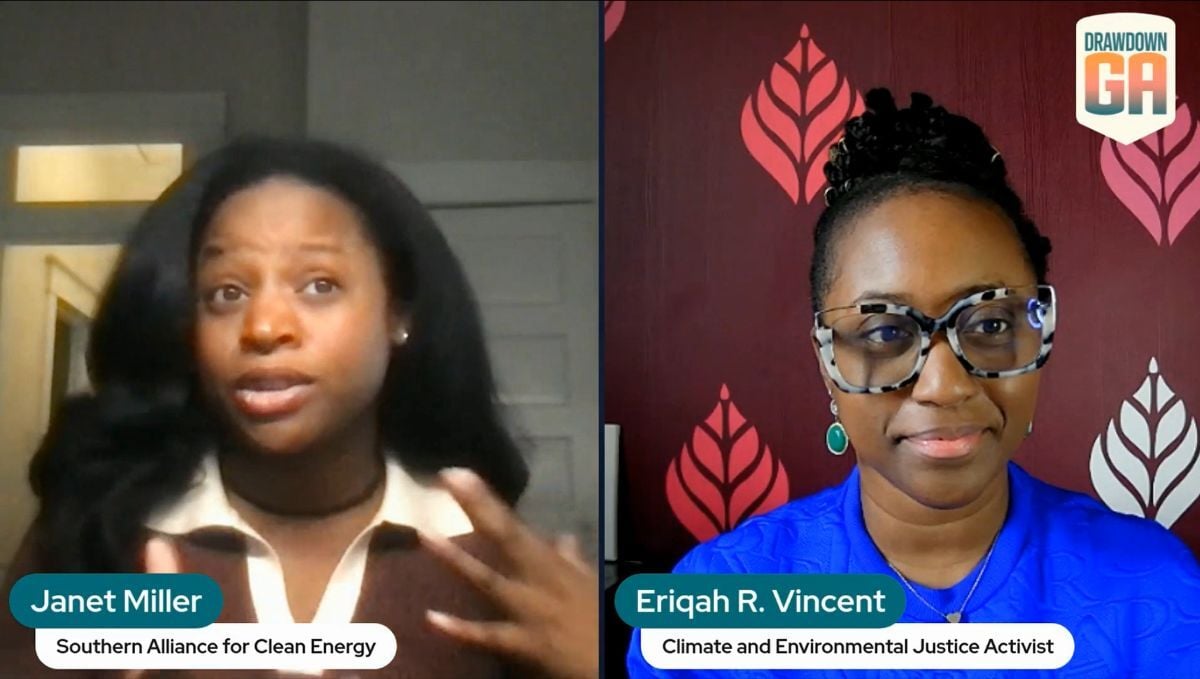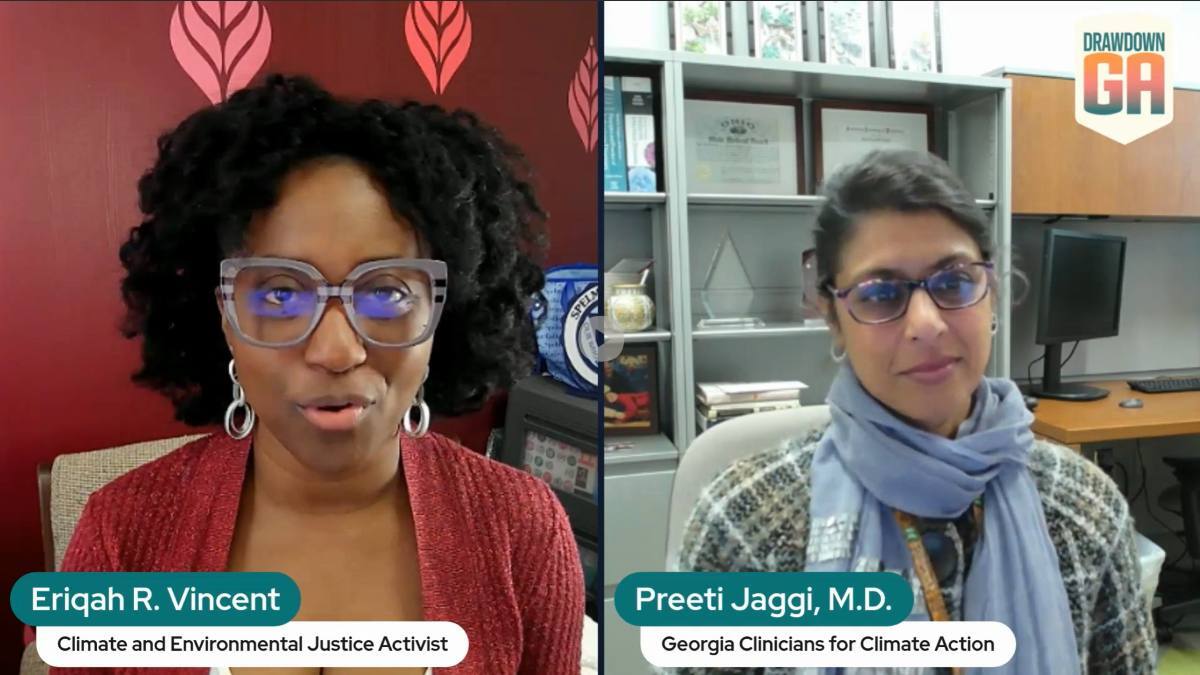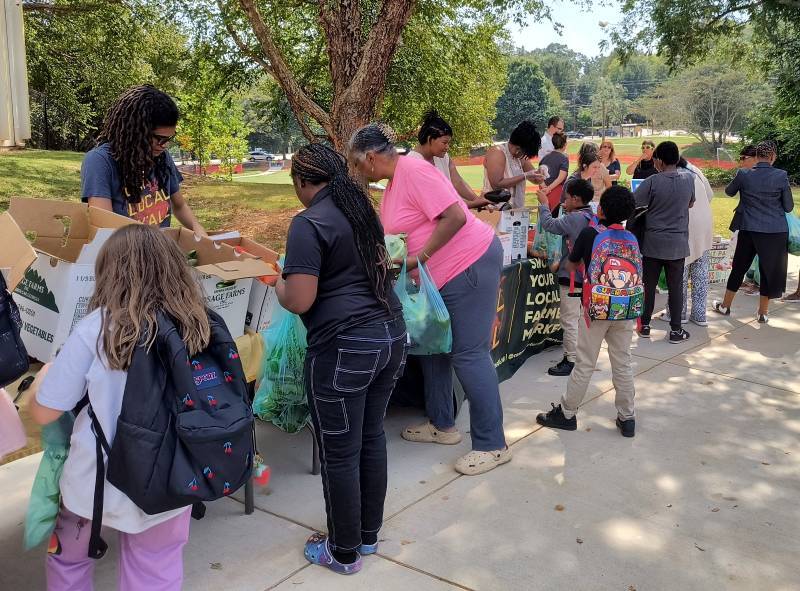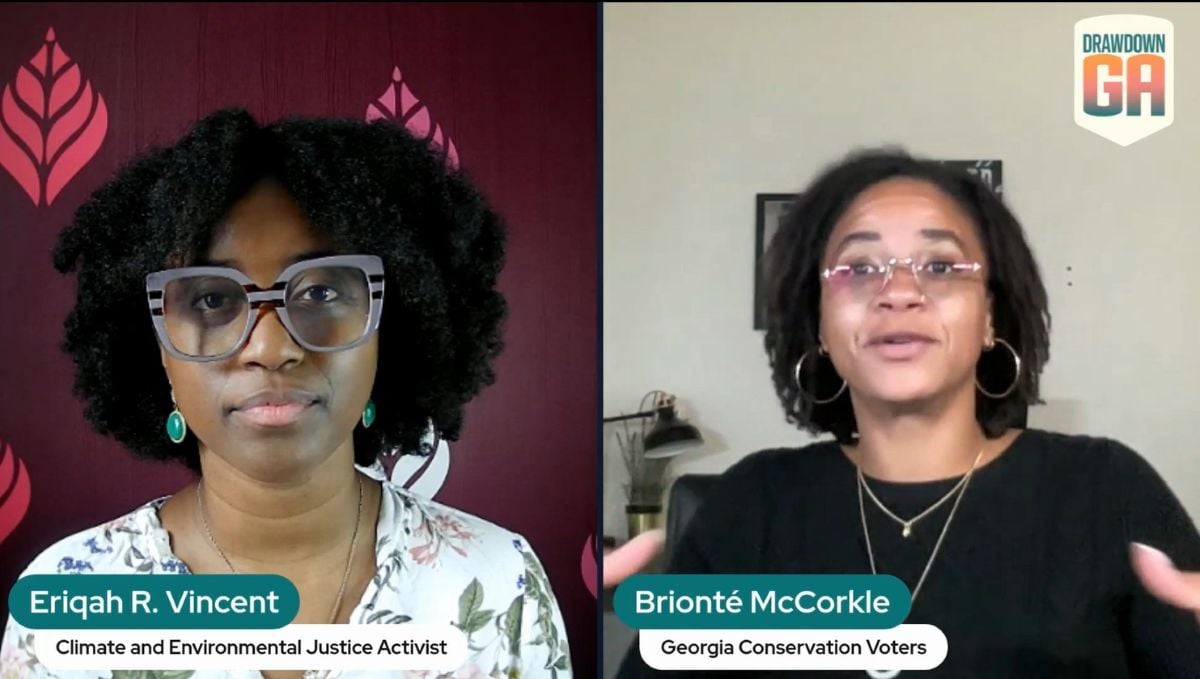Transportation profoundly influences every aspect of daily life in Georgia, from how we commute to work and school to how we access healthcare, food, and community resources. And when it is fossil-fueled, it’s the number one source of greenhouse gas emissions in our state.
But for too many Georgians, especially those in rural and underserved areas, transportation can be a barrier instead of a bridge. As the clean energy transition accelerates, one question looms large: how can we ensure that electric transportation—and all the benefits it brings—are accessible to everyone?
That’s where the Electric Black Futures Project comes in. This community-centered initiative, made possible by a grant from the U.S. Department of Energy, aims to expand equitable access to e-mobility in Georgia.
Recently, longtime climate justice advocate Eriqah Vincent sat down with Janet Miller, Electric Transportation Manager at the Southern Alliance for Clean Energy (SACE), to talk about how the project is engaging Black communities in Albany, Atlanta, and Savannah to shape the state’s clean transportation future.
Watch the video above to hear their full conversation, or keep reading to learn how the Electric Black Futures Project is empowering Georgians to build an equitable, electric future.
From Rural Roots to Clean Energy Advocacy
Janet’s connection to this work runs deep. Born in Plains, Georgia, and raised in Albany, she’s spent much of her life thinking about how environmental and health issues intersect, particularly in rural communities. “When I was younger, I was always just in awe of the natural sciences and how everything was connected,” she shared. “But I also wanted to know, how does this affect me? What’s going to happen to the air I breathe, the food I eat, or how I get from place to place?”
Her early experiences studying environmental health and interning with the City of New Orleans opened her eyes to the disproportionate impacts of pollution and climate change on Black communities. Later, while working for the City of Savannah as a clean energy coordinator, she saw firsthand how essential transportation equity is. “Especially when you’re growing up rural, people don’t realize how hard it is to get around,” Janet said. “I’m always thinking about transportation.”
That perspective now informs her work at SACE, where she focuses on making electric transportation more equitable and accessible throughout the Southeast.
Introducing the Electric Black Futures Project
At the heart of Janet’s work is the Electric Black Futures Project, a collaboration between SACE, Clean Cities Georgia, and EVNoire. The initiative is grounded in a simple but powerful idea: communities should define their own vision for an equitable electric transportation future.
“We’re going into Black communities within Albany, Atlanta, and Savannah to give them the opportunity to build out what they want an e-mobility future to look like,” Janet explained. “We’re doing research, surveys, and focus groups to understand transportation burden—how people get around, what challenges they face, and what opportunities exist.”
More than 600 Georgians have already participated in the project’s surveys, which are helping shape strategic e-mobility plans for each city. These plans will give local leaders and residents the data and insights they need to compete for federal funding, design equitable transportation systems, and develop clean mobility options that truly meet community needs.
“It’s about more than just data,” Janet said. “It’s about layering that data with storytelling from the people in these communities.” She observed that data has tremendous value in projects like Electric Black Futures, but storytelling was equally important in helping to bring those numbers to life.
>> Read more about the Electric Black Futures Project
Centering Community Voices
The Electric Black Futures Project doesn’t approach communities as test subjects; it approaches them as partners and experts in their own experiences. That starts with fair compensation: participants received $25 for completing a survey. “When you’re doing community work, you need to compensate people,” Janet said. “It shows that you value their time and insights.”
The project also emphasizes accessibility and trust. Through local liaisons and advisory boards, the team connects with community members where they already are, whether that’s a neighborhood association, a church, or a local nonprofit. Once the survey data is analyzed, the partners will host town halls in each city to share results, gather feedback, and co-create next steps.
For Janet, authentic engagement is essential. “If you really want to understand what’s going on, you have to immerse yourself,” she said. “Spend a few weeks in Savannah and take the transit. Talk to the people. See what happens when it floods and you can’t drive certain roads. Having that real experience helps inform your project so much better.”
Eriqah agreed. “Parachuting into communities is so extractive and transactional,” she said. “Sometimes you just need to go, sit, and listen to the people who’ve lived there for decades. That’s the best data you can get.”
Electric Vehicles and Equity
The project also aims to challenge misconceptions about electric vehicles in Black communities. “There’s this misconception that people of color aren’t interested in electric vehicles,” Eriqah noted. “But really, everyone deserves clean air and affordable ways to get around.”
Janet agreed that representation and exposure are key. “When EVs first came out, they were expensive, and the people buying them didn’t look like us,” she said. “So there was a disconnect. But now, we’re bringing EVs to community events, giving people the chance to sit in them, drive them, and see how they work.”
Through ride-and-drive events and partnerships with car-share programs, Janet’s team helps demystify EVs and highlight the broader benefits of electrification, from reduced air pollution to lower transportation costs. “Once people get in an EV and see how smooth and quiet it is, how easy it is to charge—it’s like night and day,” she said.
And for those who don’t drive, electrification still matters. As more school buses and city buses transition to electric, communities that have long suffered from air pollution will see real health benefits. “Those same communities that say, ‘I’ve got other things to worry about,’ are also the ones most affected by respiratory issues linked to fossil fuels,” Eriqah said. “Electrifying public transit can make an immediate difference.”
Workforce and Wealth-Building Opportunities
Beyond vehicles, the Electric Black Futures Project is also opening doors to green jobs. With major clean energy investments flowing into Georgia from companies like Kia, Rivian, Hyundai, and Q-Cells, there is a growing demand for a skilled workforce. “We’re trying to make sure people, especially people of color, can access these opportunities,” Janet said. “These are well-paying jobs that can bring economic prosperity and help build generational wealth.”
Through partnerships with technical colleges and workforce development programs, the project is helping map out pathways into these careers, from electricians who want to upskill for EV infrastructure to recent graduates seeking stable, meaningful work. “Those jobs need people,” Janet emphasized. “And it’ll be great if the people who really need it the most can take advantage of them.”
Hope for a Sustainable, Equitable Future
As their conversation drew to a close, Eriqah asked Janet what gives her hope about Georgia’s climate future. Her answer was immediate: “The investment in clean energy—billions of dollars—and the bipartisan support behind it. That’s huge. But also, it’s the people. Despite everything, Georgians are sticking together and keeping their heads up.”
Janet believes that progress might take time, but it’s coming. “Things take a while, but we’re going to get there,” she said. “Georgia has amazing organizations doing this work, and I see a bright future where everyone has a seat at the table.”
Stay Connected
The Georgia Climate Digest video interview series shares stories from the people and projects that are leading the way to a more equitable and sustainable future for our state. Subscribe now to the Georgia Climate Digest to receive future interviews, local climate news, and inspiring stories of progress delivered right to your inbox.









